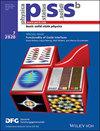Investigation of Angle‐Dependent Shubnikov‐de Haas Oscillations in Topological Insulator Bismuth
IF 1.8
4区 物理与天体物理
Q3 PHYSICS, CONDENSED MATTER
引用次数: 0
Abstract
The current article investigates the band structure in the presence and absence of spin‐orbit coupling (SOC), examines the Z2 invariants, and investigates the detailed angle‐dependent magneto‐transport of up to 10 T (Tesla) and down to 2 K for the bismuth crystal. The out‐of‐plane field‐dependent magnetoresistance (MR) is positive and is huge to the order of ≈10拓扑绝缘体铋中与角度相关的舒布尼科夫-德-哈斯振荡研究
本文研究了铋晶体在存在和不存在自旋轨道耦合(SOC)情况下的带状结构,考察了 Z2 不变量,并详细研究了铋晶体在高达 10 T(特斯拉)和低至 2 K 时随角度变化的磁传输。在 2 K 和 10 T 时,平面外磁场相关磁阻(MR)为正值,且数量级高达 ≈104%。根据横向磁场作用下电阻率与温度关系的测量结果,我们还利用波尔兹曼公式估算了热活化能。利用密度泛函理论(DFT)进行的 Z2 不变计算证实了 Bi 的拓扑性质。铋中的 PBESol 带显示出琐碎性,但混合功能(HSE)带则显示出非琐碎拓扑性。本文全面研究了磁共振振荡与外加电场和电流之间角度的关系。观察到的振荡随着角度的增大而减弱。这篇文章是我们之前关于铋的研究成果(J. Sup. Novel Mag.
本文章由计算机程序翻译,如有差异,请以英文原文为准。
求助全文
约1分钟内获得全文
求助全文
来源期刊
CiteScore
3.30
自引率
6.20%
发文量
321
审稿时长
2 months
期刊介绍:
physica status solidi is devoted to the thorough peer review and the rapid publication of new and important results in all fields of solid state and materials physics, from basic science to applications and devices. Being among the largest and most important international publications, the pss journals publish review articles, letters and original work as well as special issues and conference contributions.
physica status solidi b – basic solid state physics is devoted to topics such as theoretical and experimental investigations of the atomistic and electronic structure of solids in general, phase transitions, electronic and optical properties of low-dimensional, nano-scale, strongly correlated, or disordered systems, superconductivity, magnetism, ferroelectricity etc.

 求助内容:
求助内容: 应助结果提醒方式:
应助结果提醒方式:


